
Alpha Protocol
Written by: Rik
Date posted: March 21, 2020
- Genre: RPG
- Developed by: Obsidian Entertainment
- Published by: Sega
- Year released: 2010
- Our score: 8
When I first played Alpha Protocol, it was as part of a short-lived and ill-advised FFG series, the basis of which was that I was to leave my comfort zone (the shallow end of sports and racing games) for the supposedly more daunting proposition of an RPG. For someone raised on the gaming of the 80s and 90s, the genre was an intimidating and not particularly glamorous prospect, with my thoughts instinctively turning to the likes of Dungeon Master or Eye of the Beholder, boxy cave crawlers with levels and stats galore, games which I may have played once upon a time but never had any hope, or ambitions, of finishing.
Over time, though, the genre had evolved somewhat to become altogether more accessible, via the likes of Deus Ex and The Elder Scrolls: Morrowind in the early 00s, and at some point your modern big-budget RPG came to resemble an action game with character customisation and storyline choices. So, as it turned out, there was actually little that was strange and unusual about Alpha Protocol for me to puzzle with, and hence little tension to drive the proposed feature, although in truth it’s probably just as well that it wasn’t too complicated as I would likely have just given up. However, it was playing the game that opened the door to new worlds: to the likes of Dark Messiah of Might and Magic, Mass Effect, and The Elder Scrolls: Oblivion. Plus I also had a pretty interesting time with Alpha Protocol in and of itself, and resolved to revisit it again at some point.
As with many men my age, in a state of denial that the last 10 years have actually happened and still considering 2010 (and our 30th birthdays) to not be all that long ago really, it came as a surprise to realise that this game is also now relatively old by modern standards. But, despite my having relatively limited exposure to more recent titles, I was also surprised to note aspects of Alpha Protocol that have dated since release, or at least those that set it in a different era.One such example is the setup itself, with Alpha Protocol being very much a spy game of a post-9/11 world, concerning itself with WMDs, the war in the Middle East, and shady American oil companies. The spy in question is you, one Michael (Mike) Thorton (not Thornton), a highly trained double-hard bastard, assigned to the top-secret Alpha Protocol (Alpha Protocol) programme and sent to Saudi Arabia to recover some stolen missiles. Of course, it soon becomes more complicated, which I don’t think is a spoiler because, well, when are these things ever simple, but also because you’re soon introduced to a sinister antagonist in the first of a number of flash-forward sequences that strongly implies a lengthy series of dramatic events full of twists, turns and surprises.
This being an RPG, you can customise Mike to some considerable extent, although when it comes to what he looks like, it really amounts to little more than whether you like your obnoxious US college jocks to be clean-shaven or bearded, wear glasses or not, whether they should have a hat, and if so what kind of hat should that be. In terms of skills and expertise, there are the usual areas of focus, including guns (of different types), hand-to-hand combat, stealth, and technical expertise, and you can start with a default character type, or customise completely.
XP is earned and invested as you progress, and you can also unlock special skills to be deployed in-game. Encouragingly, you are allowed to re-spec your character once you’ve had a chance to play through a decent chunk of the game, and although obviously it still doesn’t give you an insight into what will be required later on, it does give you a chance to try things out a little before committing too far down a particular path.
The other area over which you have some considerable control is with regard to Mike’s decisions and conversation choices. They are, however, all delivered in the same insufferable way, because, whichever way you look at it, Mike Thorton is a bit of a prat. Now, I hadn’t exactly forgotten this fact, as it’s one of Alpha Protocol‘s more memorable features, but returning to Mike’s dialogue some years later was still rather jarring. An exchange between your hero and Yancy Westridge, your boss and initial handler (which is supposed to act as a set up to your character background, how the game works, and what’s going on in the world) provides a good early example:
Westridge: Read much?
Thorton: Only stop signs…which I ignore.
And there follows the first of many audible sighs when it comes to digesting the script for this game. Although you can choose different options, and this will indeed have an effect how events develop, most sane and normal people will find that they don’t quite agree with how Mike has chosen to interpret the vague instruction that appears on screen. It’s a bit like telling a tactless friend or family member to treat a conversation with some sensitivity, only to later witness them make a truly horrible job of following your instructions, as if you’d never talked to them at all.
Anyway, this scene is symptomatic of Alpha Protocol‘s early stages, which pack in so much, it’s pretty hard to follow what’s going on. Recall a meeting at work in which instructions are barked at you at a brisk pace and sound clear at the time as you enthusiastically nod your understanding, only for them to be, upon reflection, absolutely impossible to follow, and you’ll get an impression of what AP is like at the start. The aforementioned discussion with Westridge just about gets across the setup of Mike’s background, but in terms of explaining how the game works or the intricacies of the fake geopolitical situation, it only serves to confuse and make everything sound more complicated than it actually is.
Hit the game proper and it gets more straightforward on its own: you’re based in an Alpha Protocol safehouse, where you can alter your appearance (perhaps add or remove a beard or cap?), check email messages, buy new weapons and equipment (and intelligence, which might have beneficial consequences for the mission ahead), watch TV (news only, to update you on the global situation) and configure your equipment for the next mission. Up to this point, however, choices are made slightly in the dark, with only limited experience of how the game actually plays. In some respects, Saudi Arabia is a good mix of putting this to the test while also being relatively forgiving. On the other hand, you do find yourself dealing with the classic video game early-level juxtaposition of being told you’re deep inside enemy lines on a very important and difficult mission, while also being able to blunder about madly, causing a terrible racket, and get away with it.
These early stages highlight a general clumsiness which permeates all of the action. The game uses a cover system, and so much of the action involves hugging a wall or crouching behind a crate and popping up to shoot at baddies as they do the same. There is an option to shoot ‘blind’ without breaking cover, which is cool, but isn’t particularly effective, or necessary. At the default difficulty at least, you can sort of get away with staggering around in the open and firing off shots as enemies rush you. Cue mildly farcical scenes as the fairly stupid AI enemies race towards you and try to engage in hand-to-hand combat for some reason.
You’re supposed to avoid detection where possible, but alarms can and will go off all over the place here and you’ll get away with it. However, there is some satisfaction in pulling off a silent takedown, or using the hacking and lock-picking mini-games to disable alarm systems, access computers and open safes. What also becomes obvious is the relative cosiness of the maps, which might sound restrictive but are a good match with the auto-save and checkpoint system that the game employs. Navigation is pretty straightforward, and the HUD is effective in highlighting the various ammo pickups and bags of money that are scattered throughout each level.
Saudi Arabia serves very much as a taster campaign, at the end of which some Very Important Events take place, which leave you working out what what’s going on and where your loyalties lie. When it comes to dialogue, you’re not given much time to pick one of a number of responses, and they not only feel important at the time but actually do have an impact on the overall story, either in immediate and obvious ways, or more subtle ones (which you can follow to some extent on the TV news at each safehouse). This is one of Alpha Protocol‘s real strengths, and even as you wince at Thorton’s utterances, you’re also drawn into the story and the multiple branches within.
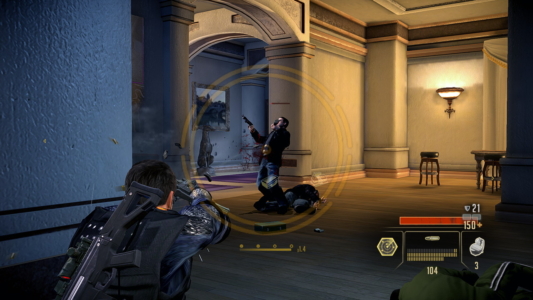
Combat controls are definitely set up for an Xbox 360 pad – fortunately (for me) mouse/keyboard works well too.
What else is there to say about Mike? He looks like a guy who probably bullied people at school, but with dialogue written by someone that he bullied. His civilian clothes very much have a late-90s, night-on-the-town ‘Saturday dancing shirt’ vibe, and you can basically either make him look like a sports captain or a ‘thoughtful’ beardy wanker who tries to chat up women by talking about his unpublished novel. The character’s voice performance is also pretty flat, although he still sounds like a dick even when you’re just reading the emails that he’s composed on your behalf.
In other words, Thorton is sort of impossible to admire: not even one of those protagonists who’s a bastard but kind of hot; just a smug, sexless tosser. (Basically, he’s Jack Reacher, but Tom Cruise’s Reacher rather than Lee Child’s). And speaking of which, when romance options present themselves later on, they become hard to negotiate mainly because you feel sorry for these poor deluded women who have unaccountably fallen in love with him. Some of the script is definitely not #metoo appropriate (or is sexist, as we used to say) either, which is not to make out that it was ok before but now isn’t, more that it always was wrong but for some reason that was overlooked at the time, which just makes it seem even worse now.
Post Saudi, you have a choice of three mission hubs: Moscow, Rome and Taipei. Which order you choose will, to an extent, affect how the endgame plays out, and plenty of other details in between, and within each hub there are also occasional opportunities to mix up the mission order, although certain ‘final’ missions are indicated. It’s all quite clever, really, but you only start to realise just how clever as you progress through the game. It’s also worth saying that each hub (including Saudi Arabia) definitely has a distinctive ‘feel’, so you do get the sense of being a globetrotting spy working in different environments.
Combat remains a bit shonky throughout, but is still pretty satisfying. Early ammo shortages can be negotiated through use of explosives, and there’s a nifty throwing aim that indicates the likely aerial path, which guards against serious accidents that the third person view might occasionally cause. The incendiary bombs are particularly enjoyable to use, although my advancing years did cause me to question the entertainment value of watching human beings rolling around in agony while on fire.
Eschewing stealth may be my natural instinct, but I dare say it would be pretty hard to get through the whole game without some decent firepower. Remaining undetected should in theory be a cinch as enemies seem to have extremely defective senses and you can also unlock a whole host of stealthy skills to help you see where they are and avoid detection. The trouble is more that once you do put your foot in it, it’s quite hard to deal with the advancing hordes in a non-lethal fashion. You can get tranquilliser ammo for your pistol although stocks seem seriously limited, and in the rare missions when shooting enemies was seriously frowned upon, my main strategy was to just leg it and rely on the fact I’d bulked up my character’s durability and armour up to that point.
In a way it sort of reminded me of Max Payne, in that smoothly choreographed moves are both possible and satisfying, but at the same time you’re equally as likely to fud everything up and bungle about but still somehow be successful. Or a version of Splinter Cell in which you pay lip service to being stealthy by knocking the first couple of guys unconscious before eventually gunning down several hundred more with the alarms blaring. Tonally, although realism does initially seem to be the main priority, there are a number of bullet-sponge boss battles during which you may (for example) find yourself emptying clips into an uzi-toting emo girl in a hoodie and jeans or a man wearing a suit and armed with a bazooka, which takes matters into slightly more pantomime/cartoon territory.
Equipment loadouts and special skills also represent the curious mix of – respectively – military-esque stats and vaguely sci-fi elements, starting off more like Bourne but veering towards Bond at various points. On that note, and while this almost certainly depends on how you play, to some extent, I did find a lot of the equipment upgrades either well out of my price range or not a significant upgrade from my existing equipment. Equally, keeping my skills relatively spread meant that I had a wide range of useful low impact options by the end but very few turbo ninja bastard moves. It could be that you have to turn the difficulty up to really see the importance of playing the stats a bit more: there certainly are lots of them, if you dig a little, but they also seem safe to ignore if you want.
What can’t be so easily ignored is the number of dialogue and story choices forced upon you with some urgency at regular intervals. As we mentioned, the Thorton bullshit-ometer will convert almost anything you say into something irritating, but that’s not to say that you aren’t going to affect things based on your responses. While other similar games might build to a choreographed and climactic big choice or two, here they seem to lie around every corner. This is arguably Alpha Protocol‘s biggest draw: the fact that there are so many choices that are both important but not always in a way that is immediately obvious, threading various characters and sub plots through the mission hubs, before largely tying up most remaining loose ends during the endgame. (I say largely, because there are so many different permutations that some characters may disappear or not have closure for their stories, depending on your choices). It’s remarkable how the developers managed to weave it all together in a coherent fashion (and I particularly like the little summaries of what actually happened during each mission, in addition to your usual stats, which helps in this regard); and exploring different paths via multiple attempts is eminently possible due to a relatively manageable playtime of around 15 hours or so.
That impressiveness comes at a cost elsewhere, with the game veering from mildly scrappy to genuinely buggy at various points, although in my case the latter never affected progress, and the most significant glitch I noted was Mike’s glasses and beard combo disappearing and reappearing during cut scenes. Since its release, details of the game’s troubled development have emerged, partly to try and make sense both of the critical shrug the game received upon release, and the cult following it’s since garnered.
Alpha Protocol is definitely an unpolished and sometimes flawed game, but what it does well, few others can match. And it does it in a way that somehow makes you ignore not only the bugs, but the silly script, the over-explanation of the plot, the dislikeable main character, and the occasionally clumsy action. While recognising all of its flaws, I can’t help but be a sucker for an ambitious game with a story to tell, allied to some relatively uncomplicated action. Plus anything that I feel compelled to come back and complete more than once holds a special place in my heart.
So, following an uncharacteristic period of agonising about scores, I’d say that this is definitely a seven out of ten type of game, but one that can be raised to an eight at the discretion of a supportive reviewer. ‘More than the sum of its parts’ is a bit of a cop-out, perhaps, but it certainly applies here. Altogether, everything adds up to a satisfying whole that’s worth at least a couple of run-throughs. One of my favourite games of the last decade; one that made me think ‘modern’ RPGs might be for me, and thus the recipient of a solid FFG recommendation.

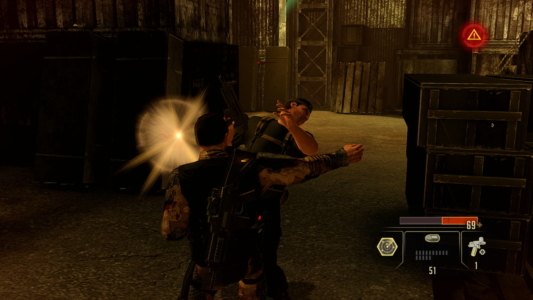
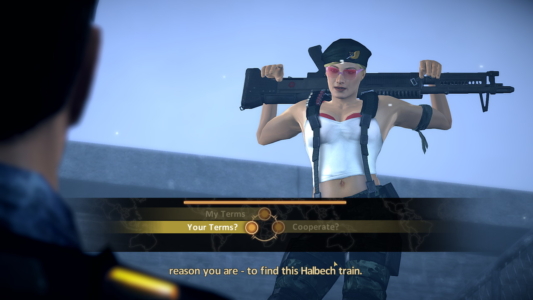
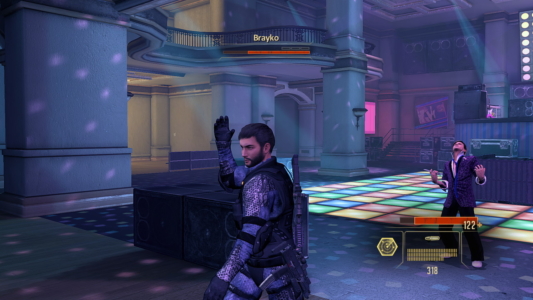
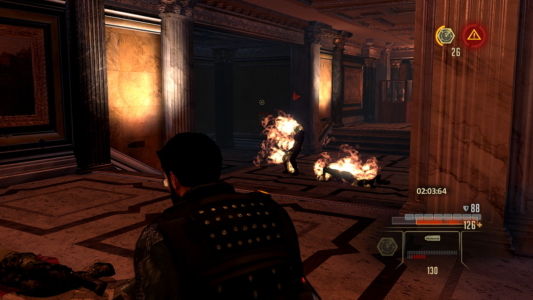
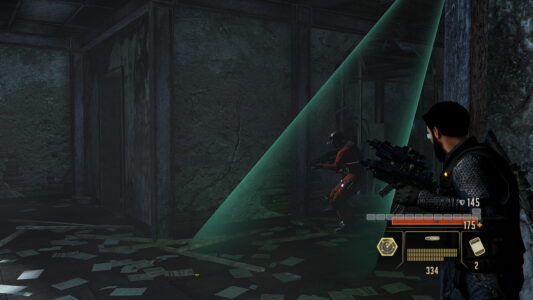

 Posts
Posts